人教新课标英语必修三 Unit 1 Festivals around the world Learning about Language 课件 (共47张PPT)
文档属性
| 名称 | 人教新课标英语必修三 Unit 1 Festivals around the world Learning about Language 课件 (共47张PPT) |
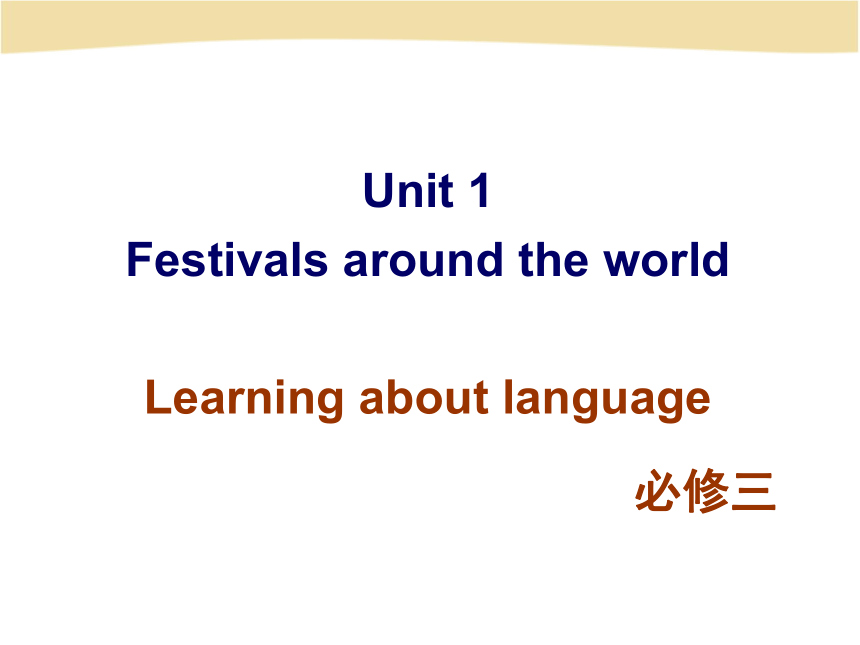
|
|
| 格式 | zip | ||
| 文件大小 | 431.7KB | ||
| 资源类型 | 教案 | ||
| 版本资源 | 人教版(新课程标准) | ||
| 科目 | 英语 | ||
| 更新时间 | 2017-05-08 00:00:00 | ||
图片预览

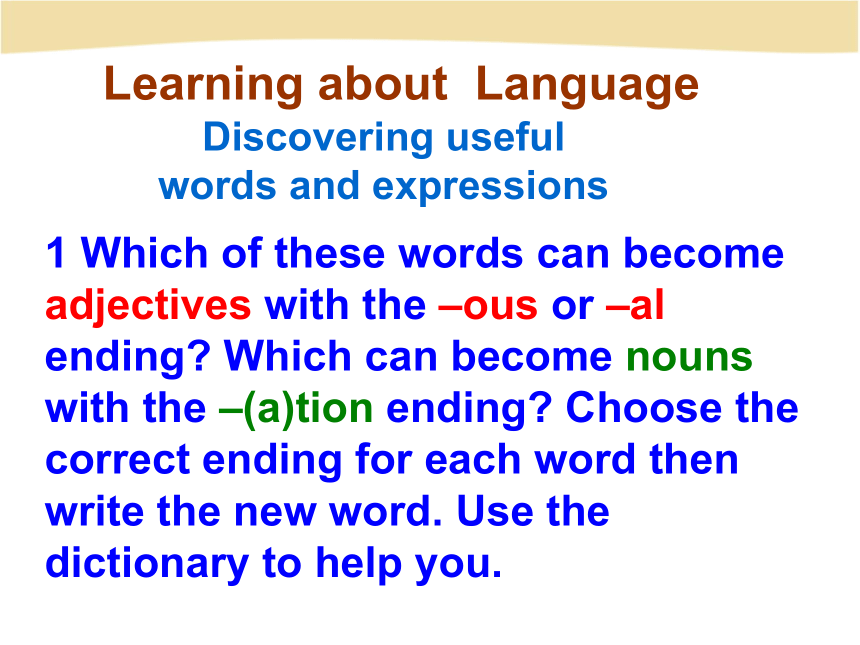
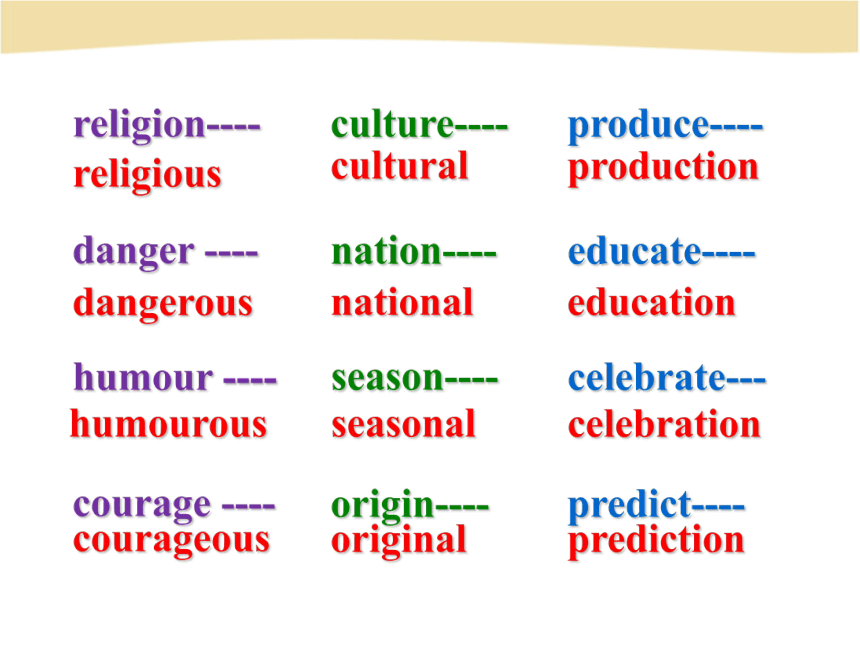
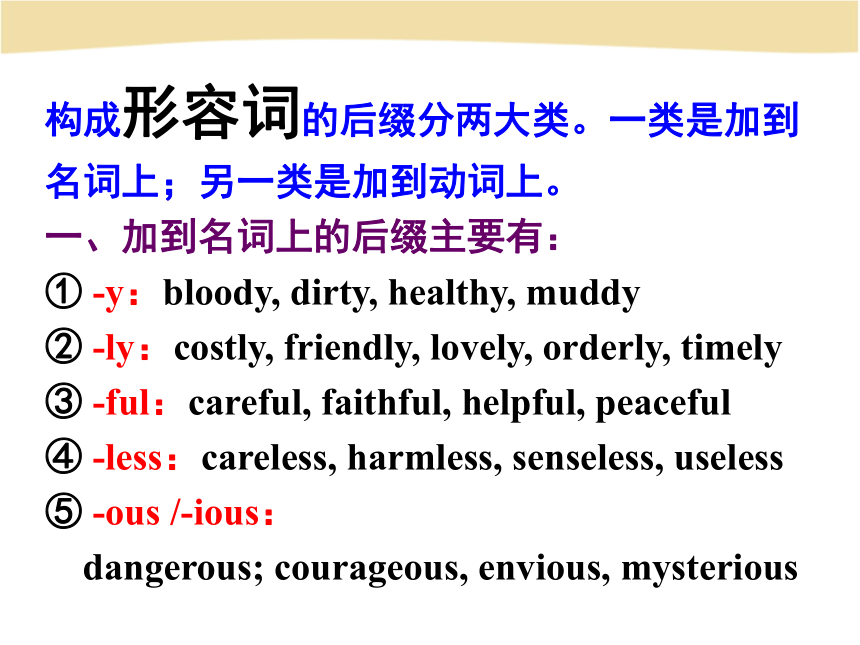
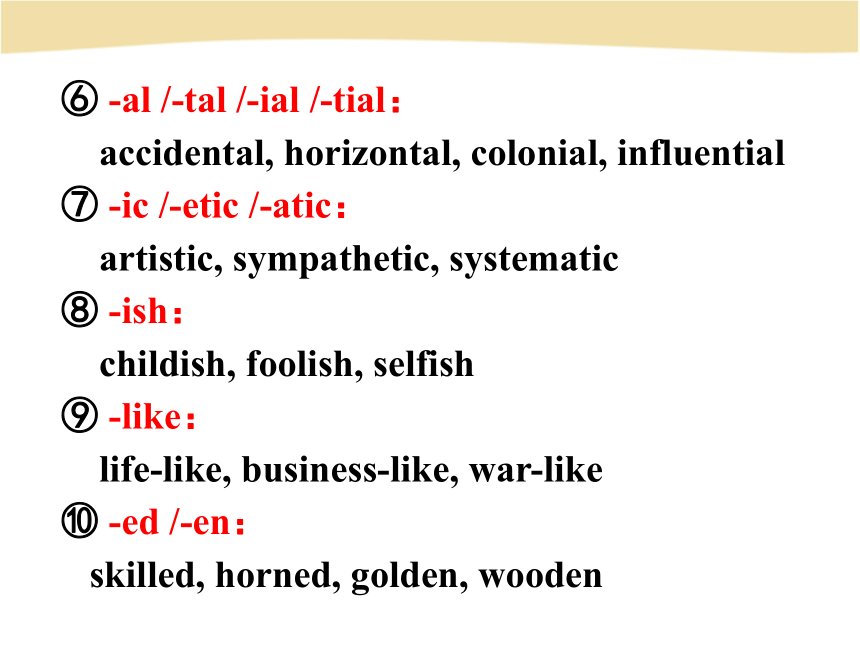
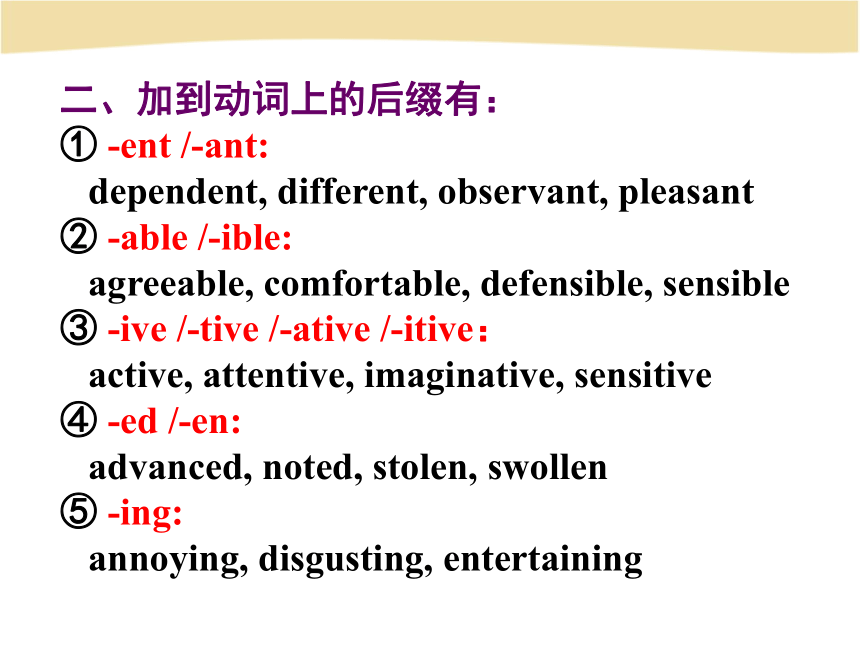
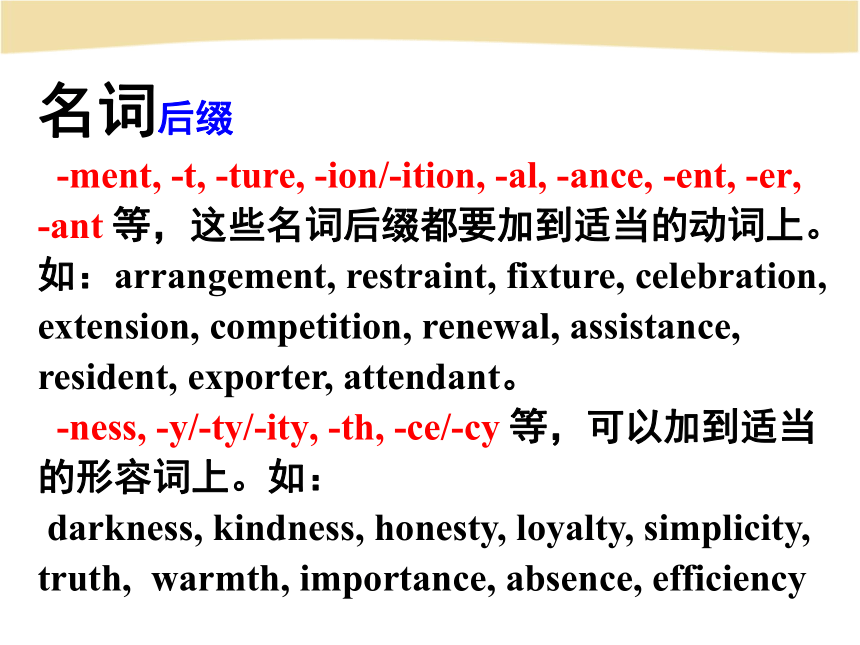
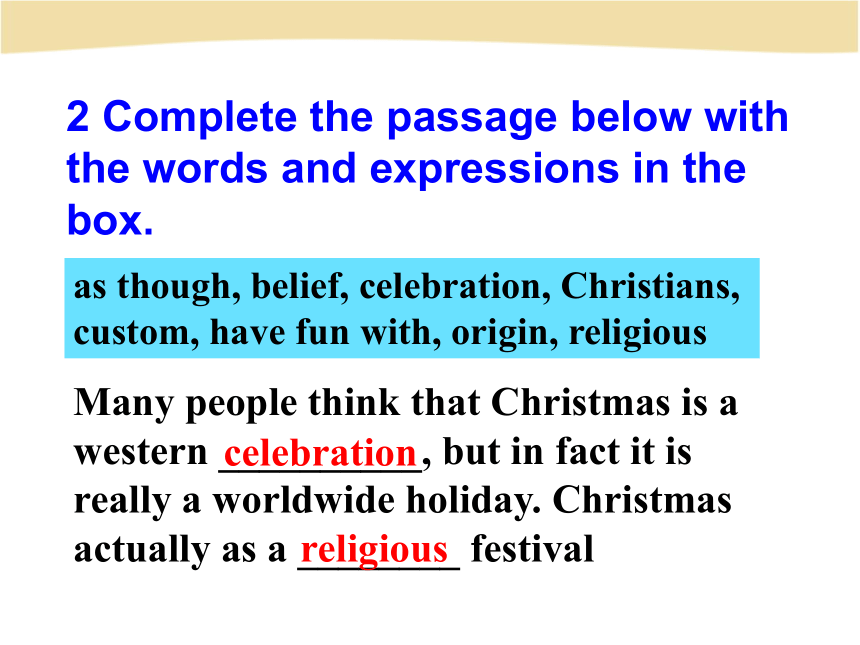
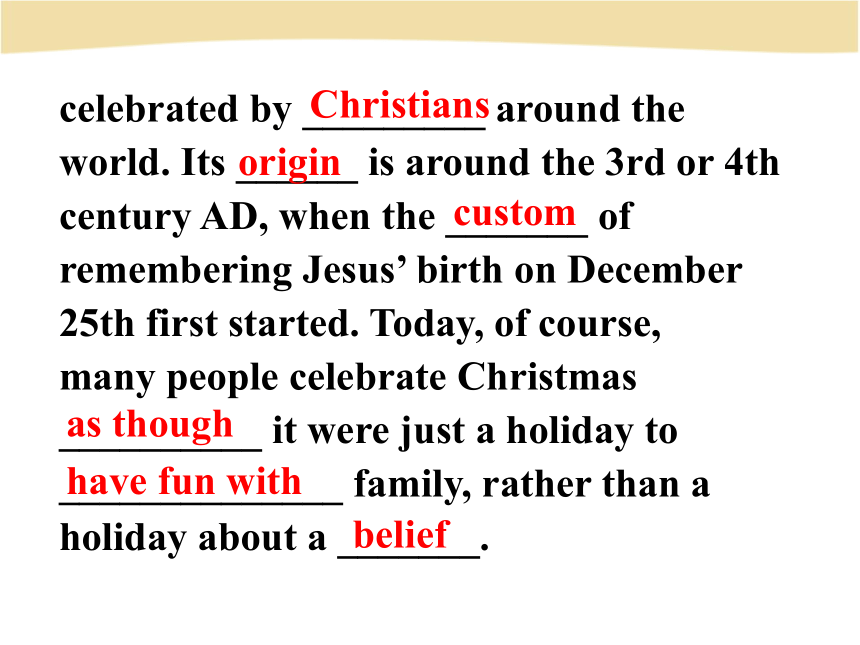
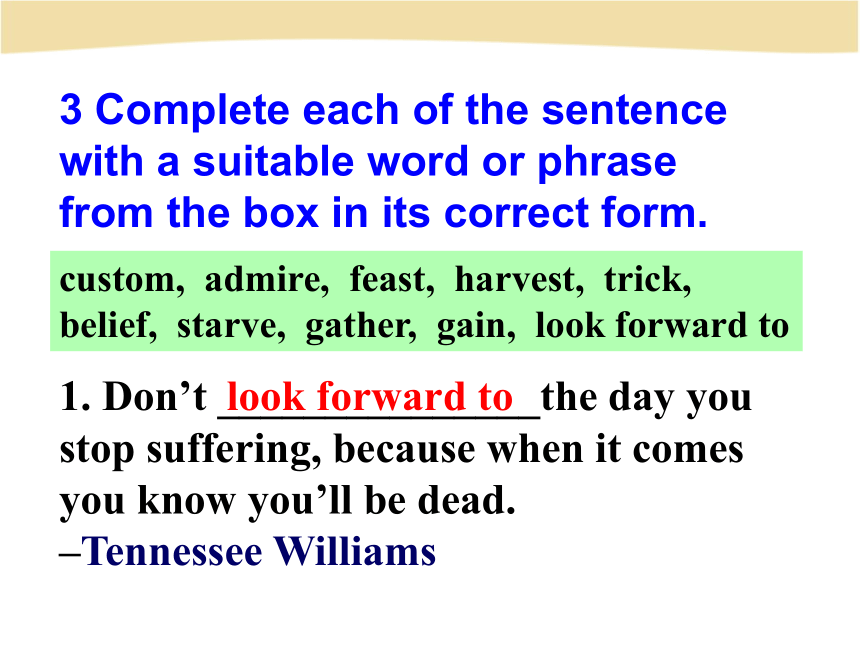
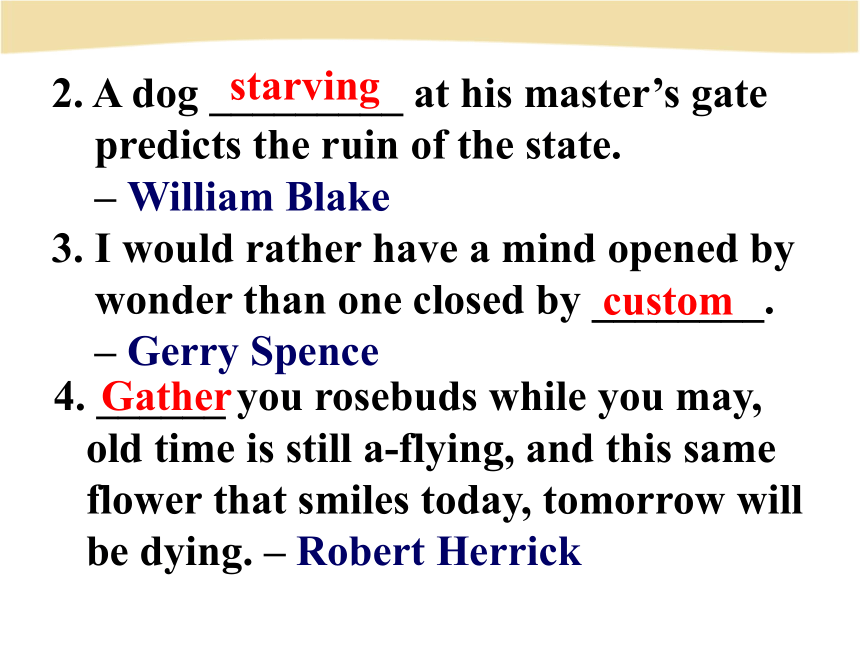
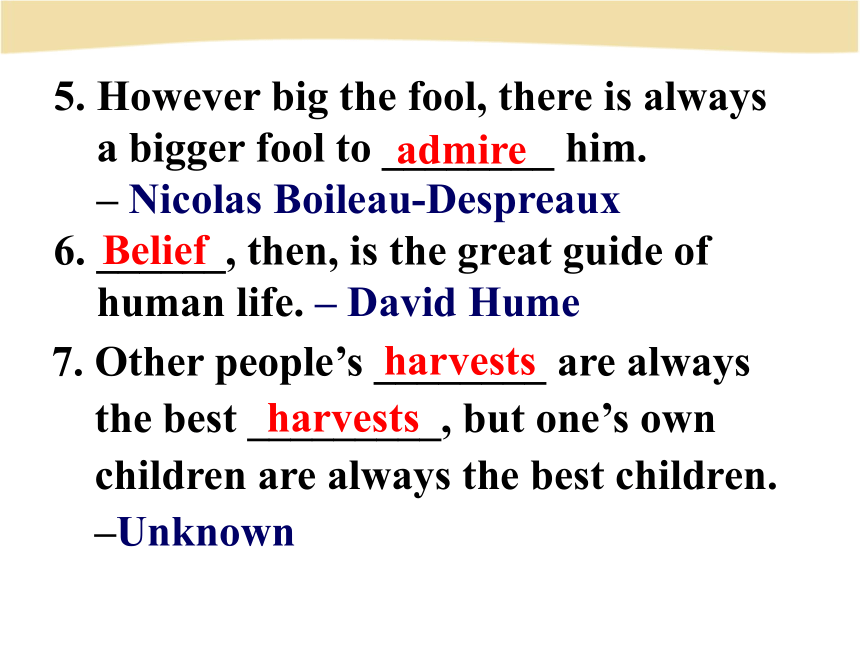
文档简介
课件47张PPT。Unit 1
Festivals around the world
Learning about language必修三Discovering useful
words and expressions 1 Which of these words can become adjectives with the –ous or –al ending? Which can become nouns with the –(a)tion ending? Choose the correct ending for each word then write the new word. Use the dictionary to help you.Learning about Languageproduce----
educate----
celebrate---
predict----culture----
nation----
season----
origin----religion----
danger ----
humour ----
courage ----religious culturalproduction dangerous nationaleducation humourousseasonal celebrationcourageous original prediction构成形容词的后缀分两大类。一类是加到名词上;另一类是加到动词上。
一、加到名词上的后缀主要有:
① -y:bloody, dirty, healthy, muddy
② -ly:costly, friendly, lovely, orderly, timely
③ -ful:careful, faithful, helpful, peaceful
④ -less:careless, harmless, senseless, useless
⑤ -ous /-ious:
dangerous; courageous, envious, mysterious⑥ -al /-tal /-ial /-tial:
accidental, horizontal, colonial, influential
⑦ -ic /-etic /-atic:
artistic, sympathetic, systematic
⑧ -ish:
childish, foolish, selfish
⑨ -like:
life-like, business-like, war-like
⑩ -ed /-en:
skilled, horned, golden, wooden二、加到动词上的后缀有:
① -ent /-ant:
dependent, different, observant, pleasant
② -able /-ible:
agreeable, comfortable, defensible, sensible
③ -ive /-tive /-ative /-itive:
active, attentive, imaginative, sensitive
④ -ed /-en:
advanced, noted, stolen, swollen
⑤ -ing:
annoying, disgusting, entertaining名词后缀
-ment, -t, -ture, -ion/-ition, -al, -ance, -ent, -er, -ant 等,这些名词后缀都要加到适当的动词上。如:arrangement, restraint, fixture, celebration, extension, competition, renewal, assistance, resident, exporter, attendant。
-ness, -y/-ty/-ity, -th, -ce/-cy 等,可以加到适当的形容词上。如:
darkness, kindness, honesty, loyalty, simplicity, truth, warmth, importance, absence, efficiencyas though, belief, celebration, Christians, custom, have fun with, origin, religious2 Complete the passage below with the words and expressions in the box.Many people think that Christmas is a western __________, but in fact it is really a worldwide holiday. Christmas actually as a ________ festival celebrationreligiouscelebrated by _________ around the world. Its ______ is around the 3rd or 4th century AD, when the _______ of remembering Jesus’ birth on December 25th first started. Today, of course,
many people celebrate Christmas __________ it were just a holiday to ______________ family, rather than a holiday about a _______. Christiansorigincustomas thoughhave fun withbeliefcustom, admire, feast, harvest, trick, belief, starve, gather, gain, look forward to3 Complete each of the sentence with a suitable word or phrase from the box in its correct form.1. Don’t _______________the day you
stop suffering, because when it comes
you know you’ll be dead.
–Tennessee Williamslook forward to 2. A dog _________ at his master’s gate
predicts the ruin of the state.
– William Blake
3. I would rather have a mind opened by
wonder than one closed by ________.
– Gerry Spencestarving custom ______ you rosebuds while you may,
old time is still a-flying, and this same
flower that smiles today, tomorrow will
be dying. – Robert HerrickGather 5. However big the fool, there is always
a bigger fool to ________ him.
– Nicolas Boileau-Despreaux
6. ______, then, is the great guide of
human life. – David Humeadmire Belief Other people’s ________ are always
the best _________, but one’s own
children are always the best children.
–Unknownharvestsharvests 8. There is no ______ on earth does not
end in parting. –Unknownfeast 9. Everyone has some ______ they can
do, but each has his own way of doing
them. –Unknown
10. Those who can lose shall _____ ;
those who wish for _____shall lose.
--Unknowntricks gain gainModal verbs 情态动词(一)Grammar情态动词的语法特征
情态动词有一定的意义,表示或暗示某种情绪或态度,表示可能、建议、愿望、必要、允许、能力等。
2. 情态动词没有人称和数的变化,即不随主语的不同而变化。
3. 情态动词不能独立使用,必须和实义动词一起构成谓语。
4. 情态动词除ought和have外,后面只能接不带to的不定式。
5. 情态动词没有非谓语形式,即没有不定式、分词等形式。 只作情态动词的: can/could, may/might,
ought to, must
可情态可实义的: need, dare/dared
可情态可助动词的: shall/should,
will/would
相当于情态动词的: have to, used to1. must, can’t
1) must 表示必须、必要, must表示主观多一些
而have to则表示客观多一些。回答must引出
的问句时, 如果是否定的回答, 不能用mustn’t,
而要用needn’t或don’t have to。如:
— Must we hand in our exercise books today?
— Yes, you must. (No, you don’t have to.)
2) can’t在口语中代替mustn’t时,表示禁止
或不准。如:
You can’t play football in the street.3) must 表示推测时, 只能用于肯定句。
There must be something wrong with the
computer. 这个电脑肯定出了问题。
You have worked hard all day. You must
be tired.你努力学了一整天了,一定累了吧。
4) must +be doing/do 表示对现在的动作进行
肯定推测。如: 他现在一定在看小说。
He must be reading novels now.
They have bought a new car. They must
have a lot of money.
他们买了一辆新车, 他们一定很有钱。5) must +have done 表示对过去发生的事情
作出的肯定判断。
他们在玩篮球,他们一定已经完成了作业。
They are playing basketball, they must have
finished their homework.
路是湿的, 昨天晚上一定下雨了。
The road is wet. It must have rained last night.
2. can, could
1) can /could 表示推测时, 只能用在否定句
或疑问句中。
It’s so late. Can Tom be reading?
这么晚了, 汤姆还在看书吗?
It can’t be Mary. She has fallen ill.
这个人不可能是玛丽, 她生病了。
She couldn’t be telling lies.
她不可能在说谎。2) can/could have done 对过去发生行为的可能
性进行推测:
刚才我还看见他了,所以他不可能出国的。
I saw him just now so he couldn’t have gone
abroad.
门是锁着的,所以她不可能在家。
The door was locked. She couldn’t have been
at home.3) can/could have done “本可以, 本来可能
已经”
用于肯定句中, 表示对过去发生的事情做出
的判断。
你本来可以考的更好。
You could have had a better mark.3. may/might
1) may/might表示推测时, 只能用于陈述句,
表示对现在或将来要发生的动作把握不大。
她们明天可能会到这里来。
They may come here tomorrow. 他们可能还在等我们呢。
They may be still waiting for us.
2) might 可用于指过去的行为或者表示可
能性更小。
他也许在作功课吧。
He might be doing his homework now.
我问他我是否可以离开。
I asked him if I might leave.
I asked him “May I leave now?”3) might/may have done, 表示对过去发生
的动作进行可能性推测。
他可能去医务室了。
He may have gone to the clinic.
他可能已经从报纸上知道这个消息了。
He might have read about the news in the
newspaper.Will /Would you do…? 表请求, 意志, 愿望, 决心。
would 表过去反复发生的动作或某种倾向
“总是,总要”
used to 表过去常常(现在已没有这种习惯)
“过去常常”
used to 可与状态动词连用, would不可以
e.g. He used to be a quiet boy. ( )
He would be a quiet boy. ( )√×4. will/would1) 表示请求、建议等, would比will委婉
客气。
Would you pass me the book?
2) 表示意志、愿望和决心。如:
I will never do that again.
They asked if we would do that again.5. shall, should
1) 在一、三人称的疑问句中, shall用来
询问对方的意愿。如:
Shall we begin our lesson?
When shall he be able to leave the
hospital?
2) 用于二、三人称的陈述句中, 表说话人
命令、警告、允诺等口吻。如: He shall have the book when I finish
reading.
You shall do as I say.
3) should表示劝告、建议、命令, 其同义
词是 ought to; 在疑问句中, 通常用
should 代替 ought to。如:
You should go to class right away.4) should/ought to have done 过去应该
做的事情而没有做, 表责备。如:
— You should have written with a pen,
not a pencil.
— Yes, I know I ought to have, but I
had no pen to write with. 5) should / ought not to have done
过去不应该做的事情却做了, 表责备、
悔恨情感。如:
I was really anxious about you. You
shouldn’t have left home without a word. I’m not feeling well in the stomach,
I shouldn’t have eaten so much fried
chicken just now.
6) needn’t have done 过去本不必做的
事情实际上却做了。如:
You needn’t have told him that. 2. When you are quite sure about something, you use _____1. When you are very sure of something, you use ____ in positive sentences and _____________ in negative sentences.e.g. You must be Jeanne. I’m Mathilde Loisel.
We used to know each other very well.
It can’t be true! I don’t believe it.e.g. Attending a ball can be exciting.Practice 1 must cannot or can’tcan. 3. When you think that something is possible,
but you are not very sure, you use _________
or _____.e.g.
You could borrow some jewelery from your
friend Jeanne, who is married to a rich man.
You may not know that the necklace I returned
is not the one that I had borrowed.
Don’t you have a friend who might lend you
some jewelry?could, maymight1. You must be Mr Smith----I was told to expect
you here.
2. He must have known what we wanted.
3. We may have read the same report.
4. He can’t have slept through all that noise.
5. What can they be doing?
6. These pills might help to cure your disease.
7. You could be right, I suppose.Practice 2:
表示推测——情态动词的重要用法Practice 3:
Complete the following sentences using modal verbs.You’ve been working all day. You ______ be very tired.
2. I wonder who that is. It _____ be Lisa. She’s in the library at this time.
3. It is a long time since we met last time. You _______ come and see us more often.
4. I haven’t decided where I’m going for my holidays. I _____ go to Australia.mustcan’tshouldmay5. My father’s birthday is coming. What
_____ I get him?
6. Why don’t you try on this dress? It _______
look nice on you.
7. --- Who was the man talking with your
teacher?
--- I’m not sure. It ______ be her brother.
8. I don’t know when the guests be here. They
_________ arrive at any time.willshallmightwill / couldDiscovering useful structuresAnswer key for exercise 1 on page 5 1. Most ancient festivals would celebrate the end of cold weather ….
2. Sometimes celebrations would be held after hunters had caught animals
3. At that time people would starve if food was difficult to find ….
4. … or to satisfy the ancestors , who might return either to help or to do harm.5. For the Japanese festival Obon , people should go to clean graves….6. It is now a children’s festival, when they can dress up and go ….
7. … the children might play a trick on them .
8. Festivals can also be held to honour famous people 9. Harvest and Thanksgiving festivals can be very happy events .
10. In European countries ,people will usually decorate churches and town halls.11. Some people might win awards for their farm produce….
12. At the Spring Festival in china ,people …may give children lucky money in red paper13. These carnivals might include parades, dancing in the streets ….
14. The country …looks as though it might be covered with pink snow. Answer key for exercise 2 on page 5 ability, ability, permission, possibility,
request
2. permission or request, possibility
3. promise or prediction, past habit,
request
4. promise, advice prediction
5. advice or necessity, guessing, guessingAnswer key for exercise 3 on page 5Sample dialogue 1:
A : Hi, Thomas! Would you like to come to a
party on Sunday?
B : Yes, I’d love to! Where and when will it be?
A : It’ll be at my home at three o’clock in the
afternoon.
B : Thanks! I’ ll be there! Should I bring
anything?
A : Hmm… Could you bring something to
drink? I’ ll have plenty to eat.
B : sure! I ‘d be happy to!Sample dialogue 2:
A : Excuse me, Mr Johnson! May I ask you a
few questions?
B : Yes, of course!
A : Well, if I want to be a doctor in the future,
what should I study?
B : You must study science, of course! It might
also be useful to study a skill that uses your hands a lot!
A : Thank you very much!
B : You are most welcome! If you have any
other questions, please don’t be afraid to
ask!Sample dialogue 3:
A : Mom, my friends are going to the cinema
in an hour. May I go with them?
B : Have you finished your homework?
A : I ‘ve finished everything except maths.
Must I finish it now? I can easily finish it
this evening.
B : You can’t be serious! You know you must
finish all your homework before you can
go out!Homework Practice of WB P42 Ex. 1, Ex 2
and Ex 3.
2. Please find out 10 sentences with
modal verbs, and try to get their
meanings.Thank You!
Festivals around the world
Learning about language必修三Discovering useful
words and expressions 1 Which of these words can become adjectives with the –ous or –al ending? Which can become nouns with the –(a)tion ending? Choose the correct ending for each word then write the new word. Use the dictionary to help you.Learning about Languageproduce----
educate----
celebrate---
predict----culture----
nation----
season----
origin----religion----
danger ----
humour ----
courage ----religious culturalproduction dangerous nationaleducation humourousseasonal celebrationcourageous original prediction构成形容词的后缀分两大类。一类是加到名词上;另一类是加到动词上。
一、加到名词上的后缀主要有:
① -y:bloody, dirty, healthy, muddy
② -ly:costly, friendly, lovely, orderly, timely
③ -ful:careful, faithful, helpful, peaceful
④ -less:careless, harmless, senseless, useless
⑤ -ous /-ious:
dangerous; courageous, envious, mysterious⑥ -al /-tal /-ial /-tial:
accidental, horizontal, colonial, influential
⑦ -ic /-etic /-atic:
artistic, sympathetic, systematic
⑧ -ish:
childish, foolish, selfish
⑨ -like:
life-like, business-like, war-like
⑩ -ed /-en:
skilled, horned, golden, wooden二、加到动词上的后缀有:
① -ent /-ant:
dependent, different, observant, pleasant
② -able /-ible:
agreeable, comfortable, defensible, sensible
③ -ive /-tive /-ative /-itive:
active, attentive, imaginative, sensitive
④ -ed /-en:
advanced, noted, stolen, swollen
⑤ -ing:
annoying, disgusting, entertaining名词后缀
-ment, -t, -ture, -ion/-ition, -al, -ance, -ent, -er, -ant 等,这些名词后缀都要加到适当的动词上。如:arrangement, restraint, fixture, celebration, extension, competition, renewal, assistance, resident, exporter, attendant。
-ness, -y/-ty/-ity, -th, -ce/-cy 等,可以加到适当的形容词上。如:
darkness, kindness, honesty, loyalty, simplicity, truth, warmth, importance, absence, efficiencyas though, belief, celebration, Christians, custom, have fun with, origin, religious2 Complete the passage below with the words and expressions in the box.Many people think that Christmas is a western __________, but in fact it is really a worldwide holiday. Christmas actually as a ________ festival celebrationreligiouscelebrated by _________ around the world. Its ______ is around the 3rd or 4th century AD, when the _______ of remembering Jesus’ birth on December 25th first started. Today, of course,
many people celebrate Christmas __________ it were just a holiday to ______________ family, rather than a holiday about a _______. Christiansorigincustomas thoughhave fun withbeliefcustom, admire, feast, harvest, trick, belief, starve, gather, gain, look forward to3 Complete each of the sentence with a suitable word or phrase from the box in its correct form.1. Don’t _______________the day you
stop suffering, because when it comes
you know you’ll be dead.
–Tennessee Williamslook forward to 2. A dog _________ at his master’s gate
predicts the ruin of the state.
– William Blake
3. I would rather have a mind opened by
wonder than one closed by ________.
– Gerry Spencestarving custom ______ you rosebuds while you may,
old time is still a-flying, and this same
flower that smiles today, tomorrow will
be dying. – Robert HerrickGather 5. However big the fool, there is always
a bigger fool to ________ him.
– Nicolas Boileau-Despreaux
6. ______, then, is the great guide of
human life. – David Humeadmire Belief Other people’s ________ are always
the best _________, but one’s own
children are always the best children.
–Unknownharvestsharvests 8. There is no ______ on earth does not
end in parting. –Unknownfeast 9. Everyone has some ______ they can
do, but each has his own way of doing
them. –Unknown
10. Those who can lose shall _____ ;
those who wish for _____shall lose.
--Unknowntricks gain gainModal verbs 情态动词(一)Grammar情态动词的语法特征
情态动词有一定的意义,表示或暗示某种情绪或态度,表示可能、建议、愿望、必要、允许、能力等。
2. 情态动词没有人称和数的变化,即不随主语的不同而变化。
3. 情态动词不能独立使用,必须和实义动词一起构成谓语。
4. 情态动词除ought和have外,后面只能接不带to的不定式。
5. 情态动词没有非谓语形式,即没有不定式、分词等形式。 只作情态动词的: can/could, may/might,
ought to, must
可情态可实义的: need, dare/dared
可情态可助动词的: shall/should,
will/would
相当于情态动词的: have to, used to1. must, can’t
1) must 表示必须、必要, must表示主观多一些
而have to则表示客观多一些。回答must引出
的问句时, 如果是否定的回答, 不能用mustn’t,
而要用needn’t或don’t have to。如:
— Must we hand in our exercise books today?
— Yes, you must. (No, you don’t have to.)
2) can’t在口语中代替mustn’t时,表示禁止
或不准。如:
You can’t play football in the street.3) must 表示推测时, 只能用于肯定句。
There must be something wrong with the
computer. 这个电脑肯定出了问题。
You have worked hard all day. You must
be tired.你努力学了一整天了,一定累了吧。
4) must +be doing/do 表示对现在的动作进行
肯定推测。如: 他现在一定在看小说。
He must be reading novels now.
They have bought a new car. They must
have a lot of money.
他们买了一辆新车, 他们一定很有钱。5) must +have done 表示对过去发生的事情
作出的肯定判断。
他们在玩篮球,他们一定已经完成了作业。
They are playing basketball, they must have
finished their homework.
路是湿的, 昨天晚上一定下雨了。
The road is wet. It must have rained last night.
2. can, could
1) can /could 表示推测时, 只能用在否定句
或疑问句中。
It’s so late. Can Tom be reading?
这么晚了, 汤姆还在看书吗?
It can’t be Mary. She has fallen ill.
这个人不可能是玛丽, 她生病了。
She couldn’t be telling lies.
她不可能在说谎。2) can/could have done 对过去发生行为的可能
性进行推测:
刚才我还看见他了,所以他不可能出国的。
I saw him just now so he couldn’t have gone
abroad.
门是锁着的,所以她不可能在家。
The door was locked. She couldn’t have been
at home.3) can/could have done “本可以, 本来可能
已经”
用于肯定句中, 表示对过去发生的事情做出
的判断。
你本来可以考的更好。
You could have had a better mark.3. may/might
1) may/might表示推测时, 只能用于陈述句,
表示对现在或将来要发生的动作把握不大。
她们明天可能会到这里来。
They may come here tomorrow. 他们可能还在等我们呢。
They may be still waiting for us.
2) might 可用于指过去的行为或者表示可
能性更小。
他也许在作功课吧。
He might be doing his homework now.
我问他我是否可以离开。
I asked him if I might leave.
I asked him “May I leave now?”3) might/may have done, 表示对过去发生
的动作进行可能性推测。
他可能去医务室了。
He may have gone to the clinic.
他可能已经从报纸上知道这个消息了。
He might have read about the news in the
newspaper.Will /Would you do…? 表请求, 意志, 愿望, 决心。
would 表过去反复发生的动作或某种倾向
“总是,总要”
used to 表过去常常(现在已没有这种习惯)
“过去常常”
used to 可与状态动词连用, would不可以
e.g. He used to be a quiet boy. ( )
He would be a quiet boy. ( )√×4. will/would1) 表示请求、建议等, would比will委婉
客气。
Would you pass me the book?
2) 表示意志、愿望和决心。如:
I will never do that again.
They asked if we would do that again.5. shall, should
1) 在一、三人称的疑问句中, shall用来
询问对方的意愿。如:
Shall we begin our lesson?
When shall he be able to leave the
hospital?
2) 用于二、三人称的陈述句中, 表说话人
命令、警告、允诺等口吻。如: He shall have the book when I finish
reading.
You shall do as I say.
3) should表示劝告、建议、命令, 其同义
词是 ought to; 在疑问句中, 通常用
should 代替 ought to。如:
You should go to class right away.4) should/ought to have done 过去应该
做的事情而没有做, 表责备。如:
— You should have written with a pen,
not a pencil.
— Yes, I know I ought to have, but I
had no pen to write with. 5) should / ought not to have done
过去不应该做的事情却做了, 表责备、
悔恨情感。如:
I was really anxious about you. You
shouldn’t have left home without a word. I’m not feeling well in the stomach,
I shouldn’t have eaten so much fried
chicken just now.
6) needn’t have done 过去本不必做的
事情实际上却做了。如:
You needn’t have told him that. 2. When you are quite sure about something, you use _____1. When you are very sure of something, you use ____ in positive sentences and _____________ in negative sentences.e.g. You must be Jeanne. I’m Mathilde Loisel.
We used to know each other very well.
It can’t be true! I don’t believe it.e.g. Attending a ball can be exciting.Practice 1 must cannot or can’tcan. 3. When you think that something is possible,
but you are not very sure, you use _________
or _____.e.g.
You could borrow some jewelery from your
friend Jeanne, who is married to a rich man.
You may not know that the necklace I returned
is not the one that I had borrowed.
Don’t you have a friend who might lend you
some jewelry?could, maymight1. You must be Mr Smith----I was told to expect
you here.
2. He must have known what we wanted.
3. We may have read the same report.
4. He can’t have slept through all that noise.
5. What can they be doing?
6. These pills might help to cure your disease.
7. You could be right, I suppose.Practice 2:
表示推测——情态动词的重要用法Practice 3:
Complete the following sentences using modal verbs.You’ve been working all day. You ______ be very tired.
2. I wonder who that is. It _____ be Lisa. She’s in the library at this time.
3. It is a long time since we met last time. You _______ come and see us more often.
4. I haven’t decided where I’m going for my holidays. I _____ go to Australia.mustcan’tshouldmay5. My father’s birthday is coming. What
_____ I get him?
6. Why don’t you try on this dress? It _______
look nice on you.
7. --- Who was the man talking with your
teacher?
--- I’m not sure. It ______ be her brother.
8. I don’t know when the guests be here. They
_________ arrive at any time.willshallmightwill / couldDiscovering useful structuresAnswer key for exercise 1 on page 5 1. Most ancient festivals would celebrate the end of cold weather ….
2. Sometimes celebrations would be held after hunters had caught animals
3. At that time people would starve if food was difficult to find ….
4. … or to satisfy the ancestors , who might return either to help or to do harm.5. For the Japanese festival Obon , people should go to clean graves….6. It is now a children’s festival, when they can dress up and go ….
7. … the children might play a trick on them .
8. Festivals can also be held to honour famous people 9. Harvest and Thanksgiving festivals can be very happy events .
10. In European countries ,people will usually decorate churches and town halls.11. Some people might win awards for their farm produce….
12. At the Spring Festival in china ,people …may give children lucky money in red paper13. These carnivals might include parades, dancing in the streets ….
14. The country …looks as though it might be covered with pink snow. Answer key for exercise 2 on page 5 ability, ability, permission, possibility,
request
2. permission or request, possibility
3. promise or prediction, past habit,
request
4. promise, advice prediction
5. advice or necessity, guessing, guessingAnswer key for exercise 3 on page 5Sample dialogue 1:
A : Hi, Thomas! Would you like to come to a
party on Sunday?
B : Yes, I’d love to! Where and when will it be?
A : It’ll be at my home at three o’clock in the
afternoon.
B : Thanks! I’ ll be there! Should I bring
anything?
A : Hmm… Could you bring something to
drink? I’ ll have plenty to eat.
B : sure! I ‘d be happy to!Sample dialogue 2:
A : Excuse me, Mr Johnson! May I ask you a
few questions?
B : Yes, of course!
A : Well, if I want to be a doctor in the future,
what should I study?
B : You must study science, of course! It might
also be useful to study a skill that uses your hands a lot!
A : Thank you very much!
B : You are most welcome! If you have any
other questions, please don’t be afraid to
ask!Sample dialogue 3:
A : Mom, my friends are going to the cinema
in an hour. May I go with them?
B : Have you finished your homework?
A : I ‘ve finished everything except maths.
Must I finish it now? I can easily finish it
this evening.
B : You can’t be serious! You know you must
finish all your homework before you can
go out!Homework Practice of WB P42 Ex. 1, Ex 2
and Ex 3.
2. Please find out 10 sentences with
modal verbs, and try to get their
meanings.Thank You!
同课章节目录
